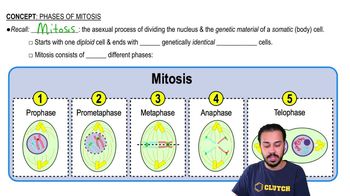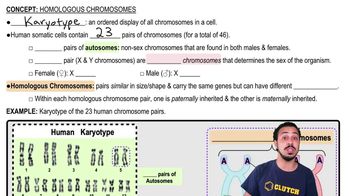Here are the essential concepts you must grasp in order to answer the question correctly.
Mitosis
Mitosis is a type of cell division that results in two genetically identical daughter cells, each with the same number of chromosomes as the original cell. In humans, somatic cells undergo mitosis to maintain the diploid number of chromosomes, which is 46. This process is crucial for growth, repair, and asexual reproduction.
Recommended video:
Chromosome Number
Chromosome number refers to the total count of chromosomes in a cell. In humans, somatic cells are diploid, containing 46 chromosomes (23 pairs). During mitosis, the chromosome number remains constant, ensuring that each daughter cell retains this diploid state, which is essential for normal cellular function.
Recommended video:
Daughter Cells
Daughter cells are the two new cells that result from the division of a single parent cell during mitosis. Each daughter cell inherits an identical set of chromosomes from the parent cell, maintaining the same chromosome number. This genetic consistency is vital for the proper functioning and stability of tissues in multicellular organisms.
Recommended video:
Introduction to Cell Division



